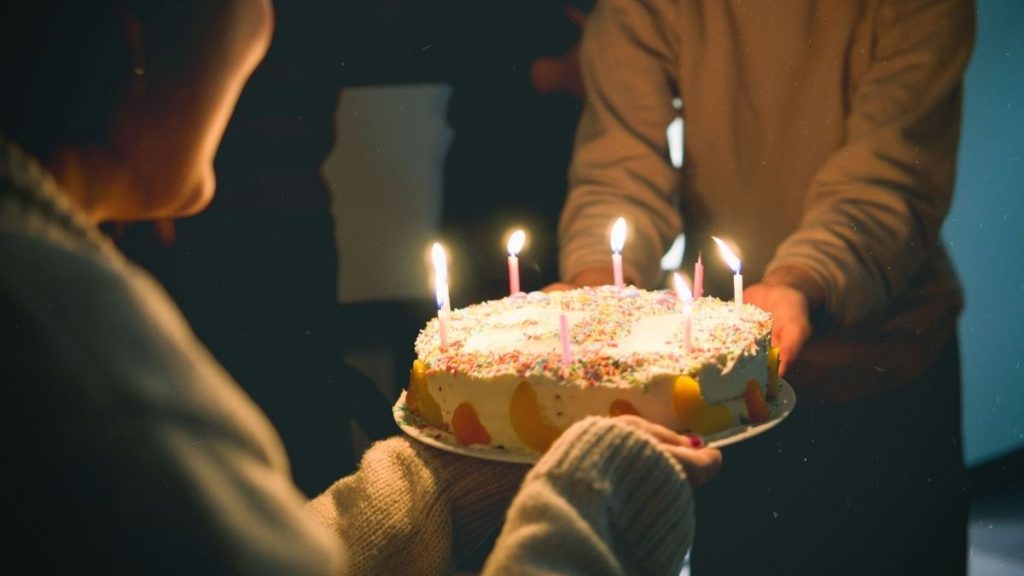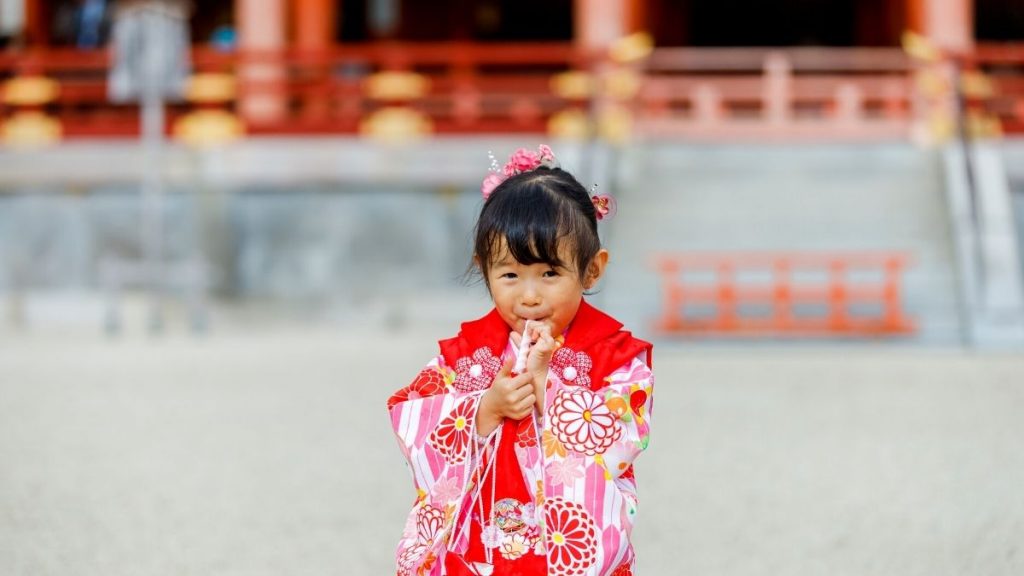Want to know how to say ‘happy birthday’ in Japanese? You’re in the right place.
It’s always nice to wish someone a happy birthday on their special day but why not do it in a language that means something to them.
As well as wishing your loved one a happy birthday in Japanese, why not also sing the Japanese version of the happy birthday song!
Read on to learn more about this.
Table of Contents
How To Say ‘Happy Birthday’ In Japanese
To wish someone a happy birthday in Japanese, you can say:
| English | Japanese | Pronunciation |
|---|---|---|
| Happy birthday | お誕生日おめでとう | O-tanjoubi omedetou |
| Happy birthday (more polite) | お誕生日おめでとうございます | O-tanjoubi omedetou gozaimasu |
The first phrase (‘O-tanjoubi omedetou’) would be used with friends and family.
You can use the second, more polite phrase (“O-tanjoubi omedetou gozaimasu”) with people you don’t know very well, older people or someone in a higher position e.g. a boss. Here the “gozaimasu” is what makes it more polite.
These phrases literally mean ‘congratulations on your birthday’ and are the most common way to wish someone a happy birthday in Japan.
To hear the pronunciation of these phrases, check out the video below:
Another fun way to wish someone a ‘happy birthday’ is by using this fun Japanese version of the English phrase:
| English | Japanese | Pronunciation |
|---|---|---|
| Happy birthday | ハッピーバースデー | Happii baasudee |
Japanese Birthday Wishes & Phrases
Alternatively, you can also use some of these phrases:
| English | Japanese | Pronunciation |
|---|---|---|
| All the best | ご多幸をお祈りします | Go takou o oinori shimasu |
| Congratulations | おめでとうございます | Omedetou-gozaimasu |
| Have a great day | 素敵な一日を | Sutekina ichinichi o |
| Have fun | 楽しんでください | Tanoshinde kudasai |
| May you have a wonderful year | 素晴らしい一年になりますように | Subarashii ichi nen ni narimasu you ni |
| Have a great birthday | 素敵なお誕生日をすごしてください | Sutekina o tanjoubi o sugoshite kudasai |
Birthday Vocabulary In Japanese

I’ve listed some handy Japanese birthday vocabulary below. These should come in handy if you’re celebrating a birthday!
| English | Japanese | Pronunciation |
|---|---|---|
| Birthday | 誕生日 | Tanjoubi |
| Party | パーティー | Paatii |
| Birthday cake | 誕生日ケーキ | Tanjoubi keeki |
| Candles | キャンドル | Kyandoru |
| Present/gift | 贈り物 | Okurimono |
| Birthday card | バースデーカード | Baasudeekaado |
| Birthday boy | 誕生日の男の子 | Tanjoubi no otokonoko |
| Birthday girl | 誕生日の女の子 | Tanjoubi no on’nanoko |
| Invitation | 招待 | Shoutai |
| Surprise | 驚き | Odoroki |
How To Sing Happy Birthday In Japanese
If you want to go the extra mile for your loved one or friend, try singing the happy birthday song in Japanese. You’ll be happy to know it’s the same tune as the English version, they just sing it in Japanese.
Check out the video below to hear the Japanese birthday song. I’ve listed the lyrics below so you can sing along.
Here’s the lyrics so you can sing along:
“誕生日おめでとう(Tanjoubi omedetou)
誕生日おめでとう(Tanjoubi omedetou)
誕生日おめでとう(Tanjoubi omedetou)
誕生日おめでとう(Tanjoubi omedetou)”
This translates to:
“Happy birthday!
Happy birthday!
Happy birthday!
Happy birthday!”
It is also actually really common for people in Japan to just sing the English version of the happy birthday song but with a Japanese accent. You can hear it below.
Japanese Birthday Traditions
Birthday traditions can be very important to many people on their birthdays. To make your loved one feel extra special you can also try some of these Japanese birthday traditions.
Birthdays weren’t celebrated much in Japan until the 1950’s. Around this time, there was a huge influx of Western culture including birthday traditions such as parties, music, cake and candles.
Prior to this, most people in Japan celebrated their birthday on January 1st as this was seen as the day that everyone got one year older. New Years Day is still a very special day in Japan and comes with a big celebration but nowadays people also tend to celebrate their birthday on the day they were born.
Here’s some fun Japanese birthday traditions.
Friends Pay, Organize & Pay For Everything
It is customary for the friends of the birthday person to not only organize the party or celebration but also pay for everything. The birthday girl/boy is not expected to pay for anything.
This allows the birthday person to relax and enjoy their day so they don’t have to worry about money.
Celebrate With Your Partner
If you have a boyfriend/girlfriend, you would usually spend your actual birthday with your partner. This day tends to be reserved solely for you and your partner.
Friends will usually organize a birthday party or celebration on a different day to leave this day free for you and your partner.
Shichi-Go-San Tradition

Shichi-Go-San literally means ‘7, 5, 3’ and this represents a girl’s 7th birthday, a boy’s 5th birthday and both sexes’ 3rd birthday.
On these birthday years on the 15th November, children are taken to a shrine usually dressed in traditional Japanese clothes.
They usually also get a traditional birthday gift called a ‘Chitose ame’ (thousand year candy) which is just a red and white sweet which symbolizes health and longevity.
20th Birthday
One of the biggest birthdays is a person’s 20th birthday as this is seen as the coming of age birthday, similar to 18th or 21st birthdays in other countries.
This birthday is usually celebrated with a traditional ‘成人式’ Seijin shiki ceremony in January where everyone that turned 20 the previous year get together to celebrate. Girl’s will often wear traditional kimonos.
Big Birthdays
As well as the 20th birthday, there are a few other big birthdays that have great significance for various reasons.
60th Birthday – this birthday signifies the end of the zodiac cycle and rebirth. Someone who reaches 60 has successfully completed the 5 cycles.
It is known as the ‘red birthday’. The birthday person will usually be given a red piece of clothing to signify rebirth.
77th Birthday – this age is seen as the ‘happy age’ and is a privilege to reach such an age.
88th Birthday – this birthday is called your ‘rice birthday’ as the symbol for 88 looks similar to rice when written in Japanese. Rice is seen as a symbol of goodness.
99th Birthday – this birthday is known as the ‘white birthday’. Many guests will wear white to the birthday celebration.
Thanks for reading this post on how to say ‘happy birthday’ in Japanese.
It’s a great idea to make the effort to learn how to say this in someone’s native language or a language that means something to them.
Your loved one or friend will be so impressed!
Mother’s Day or Father’s Day coming up? Learn how to wish your parents a happy mother’s day or happy father’s day in Japanese.
Related posts:
